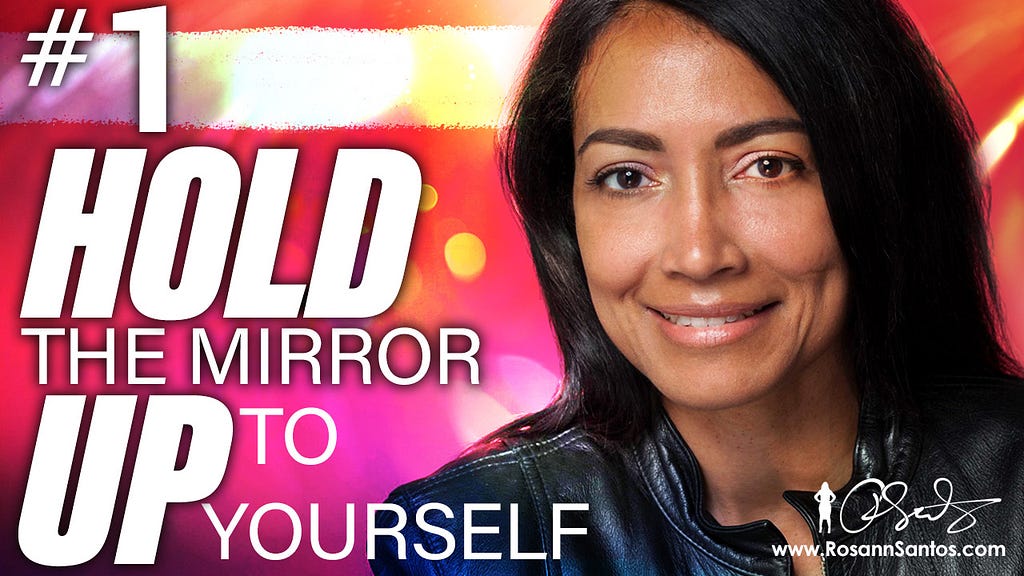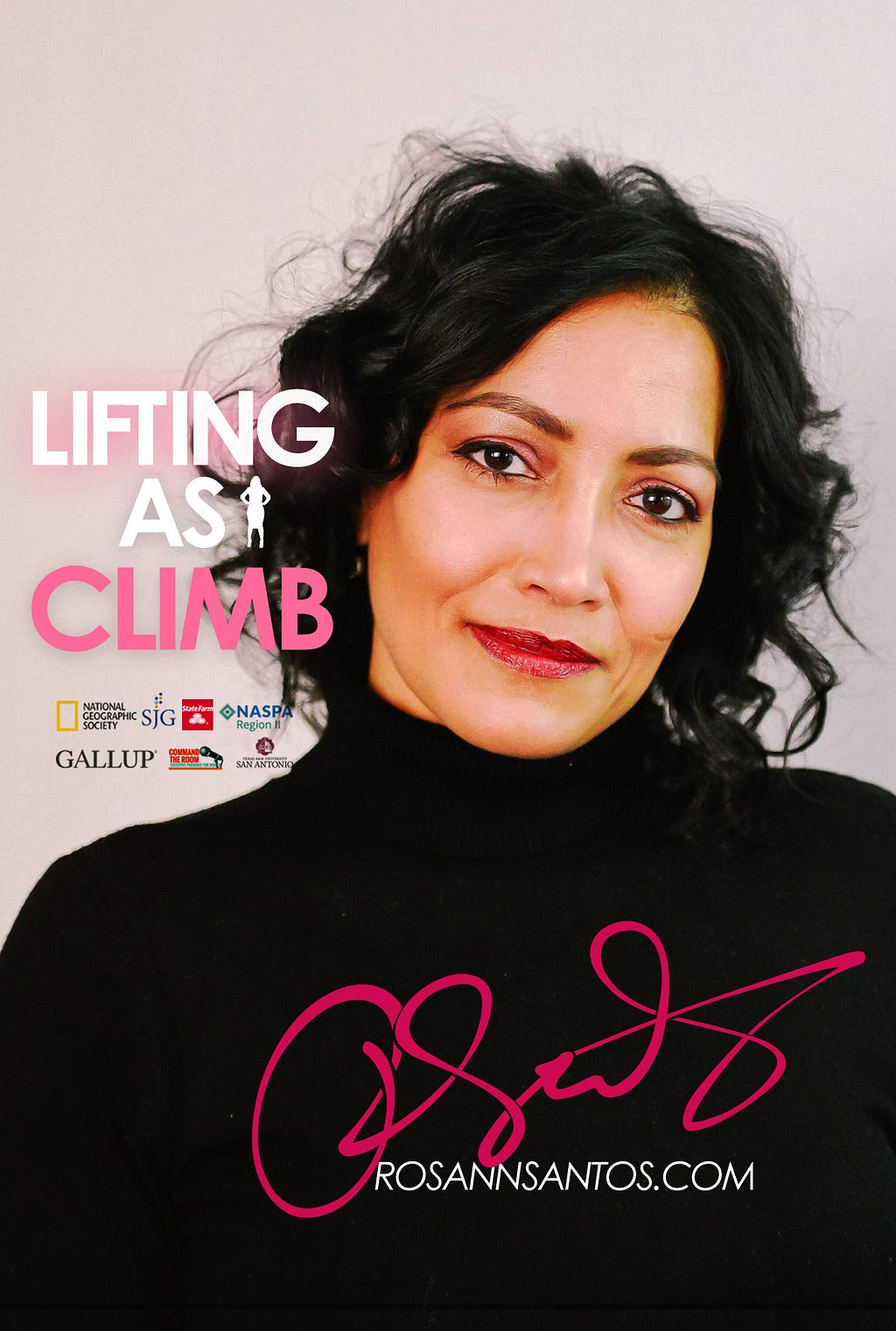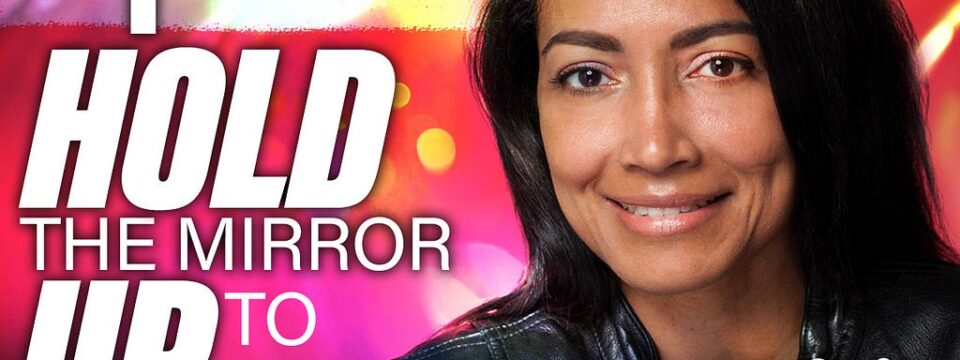Rosann Santos On 5 Steps We Must Take To Truly Create An Inclusive, Representative, and Equitable Society

Be intentional and strategic. We can neither take all of this on by ourselves nor all at once. Pick your battles but be intentional and strategic. Remember to not dwell on the things you cannot control. Focus on where your influence lies and start from there. For me this means networking with as many folks as possible and sitting at those all-important tables as often as I can.
As part of our series about ‘5 Steps We Must Take To Truly Create An Inclusive, Representative, and Equitable Society’ I had the pleasure to interview Rosann Santos.
Rosann Santos is one of the most specialized, in-demand motivational speakers in both English and Spanish. She is certified as a Gallup Strengths coach and facilitator and is an ICF Certified Professional Coach. She is also certified in FranklinCovey’s Unconscious Bias and The 7 Habits of Highly Effective People content. She is also the co-host of a professional development podcast called Design Your Decade: Journey to the C-Suite.
Thank you so much for doing this with us! Before we dig in, our readers would like to ‘get to know you’. Can you tell us a bit about how you grew up?
I grew up in the Bronx, the daughter of Dominican immigrants. I attended Catholic schools my entire life, first thru 12th. It was a strict upbringing but extremely loving and tight-knit. We had a tight extended family too…lots of cousins and we always had fun together. We still do.
Is there a particular book that made a significant impact on you? Can you share a story or explain why it resonated with you so much?
There are so many books I love. I think the book that catapulted my business was probably Executive Presence: The Missing Link between Merit and Success by Dr. Sylvia Ann Hewlett. She broke down the three pillars: Gravitas, Communication and Appearance. I wanted to move up in my industry and wanted to make sure I could check all the boxes. I still find this book important but when I read The Leader’s Guide to Unconscious Bias: How to Reframe Bias, Cultivate Connection, and Create High-Performing Teams by Pamela Fuller, Mark Murphy, and Ann Chow I realized that executive presence can be a biased construct. And while I still believe EP is hugely important to a career, it must be deconstructed and then rebuilt to include authenticity with an eye toward inclusive culture. To be fair, Dr. Hewlett does touch on authenticity at the end of the book, but it is not enough.
Do you have a favorite “Life Lesson Quote”? Do you have a story about how that was relevant in your life or your work?
Without change there can be no butterflies. This quote has resonated so much with me over the last decade or so. In the past decade, I lost 100 lbs, got divorced, lost my father and brother during COVID, took charge of the care of my 85-year-old mother, and bought a house. NONE of these situations were easy or fun. Not even buying a house. These milestones in my life all required serious changes to the paradigms and mindsets I held. I had to rethink food, money, death, and health. They were the creepy crawly aspects of my life that required a high level of change to go through the steps to become a beautiful butterfly. And I am sure it’s not over. I appreciate every moment of the steps to change because I am less likely to take anything for granted ever again.
How do you define “Leadership”? Can you explain what you mean or give an example?
Leadership is not about titles or money. Leadership is about the trust that others have in you to do the right thing and take them down the right path. Even when the path you take falls flat, a leader shakes it off, apologizes and regroups using the feedback and support of the people they lead, moving down a new path toward the goal.
Last year, I was asked to return to my old role at the college where I work. For 8 years, I oversaw the commencement ceremonies. Due to the pandemic, they were postponed for 3 years. In 2022, the President of the college made the decision to host one commencement that would include 2020, 2021 and 2022. She called me in for a meeting and asked me to take on the task. No one had executed commencement since I left the role in 2019 and would I consider doing this large task. I said yes and planned commencement for over 5,000 students and over 20,000 guests in just 4 months. It was an imperative that I did not take likely.
While planning commencement, I also worked toward training those who would oversee commencement 2023 and beyond. This meant executing contracts, tickets, logistics, staffing and a half a million-dollar budget while training the future commencement staff. It was hard but fulfilling and I am happy to say that commencement 2023 went off without a hitch due to my successors.
Ok, thank you for all that. Now let’s move to the main focus of our interview. In the summer of 2020, the United States faced a very important self-reckoning about race, diversity, equality, and inclusion. This is of course a huge topic. But briefly, can you share your view on what made the events of 2020 different from racial reckonings in the past?
It was the perfect storm: 8 minutes of a knee on a neck combined with the direction of American politics combined with a global pandemic. All three of these moments in time put a giant magnifying glass over American society and the injustices, indifferences and isms that already existed but continued to go unchecked. A white cop arrogantly pushed his knee into George Floyd’s neck for over 8 minutes, not caring that multiple people were recording it. The hypocrisy of American government was divisive, infuriating, and sad. Then we experienced a pandemic that so clearly demonstrated the inequities of health care and health policy, that it was hard to ignore.
Can you tell our readers a bit about your experience working with initiatives to promote Diversity and Inclusion? Can you share a story with us?
As a keynote speaker, I always do my best to work into my remarks the importance of open-mindedness to grow and connect with others. It’s usually why I am called upon to speak to audiences. Understanding race, ethnicity and gender is a powerful place to begin when discussion initiatives that promote diversity and inclusion. However, it is not the only place. As I mentioned earlier, in the last 10 years, I have lost 100 lbs., gotten a divorce becoming a single mom, lost my father and brother during COVID and bought a house. All those aspects of my life have created experiences that have required me to deal with bias and isms. Single motherhood and divorce come with all kinds of stigma. You would not think so today, but within Latinx families, it can be very isolating. Being 278 lbs. carries another set of stereotypes. No pun intended! And so on.
I have dedicated my life to working with individuals and groups to see beyond the stereotypes and microaggressions that can limit others and themselves. Most of my coaching clients tend to be women of color. And they often battle invisibility and voicelessness that began when they were young girls and not necessarily when they started their careers. They are trapped by their own internal struggles and that is just as limiting. I work with people to help them overcome those challenges.
This may be obvious to you, but it will be helpful to spell this out. Can you articulate to our readers a few reasons why it is so important for a business or organization to have a diverse executive team?
First, it’s the right thing to do. But second, if the right thing to do is of no interest, then understand that the bottom line is at stake when you ignore the importance of diversity and inclusion. From an organizational and business perspective, diverse teams are more innovative. Diversity in your executive team means that different people of all demographics are seeing challenges and problems from different lenses. Doing so, let’s you get to an impactful solution more quickly. Younger consumers are also watching. Millennials and Gen Z are known for choosing products to buy and companies to work for that have an eye toward “doing the right thing.” Even me as a Gen Xer…I am not going to support an enterprise that is not actively working on diversity, equity and inclusion. Doing the right thing and the bottom line…balance those two together and we could go far.

Ok. Here is the main question of our discussion. You are an influential business leader. Can you please share your “5 Steps We Must Take to Truly Create An Inclusive, Representative, and Equitable Society”? Kindly share a story or example for each.
- Hold the mirror up to yourself. What prejudices and biases do you hold that are holding you back, maybe even unconsciously? Get those biases under control because how can any of us do this work if we haven’t first examined the isms we hold. I used to head straight to the education section of a resume when I was on a search committee. It had a strong bias for a four-year, private education. But I know now that it is a seriously limiting method to finding great talent for an organization.
- Leap out of that self-limiting box you live in. Who do you mentor? Where do you eat? Who do you network with? What books do you read? When you answer these questions read #1 again and make some changes that will help you grow and connect with others. I used to want to be the president of a college or university many moons ago. Well, my network included zero white men. And guess who most college presidents are? Yep, white men. My network looked a lot like me, and I needed to get out of my box and find ways to meet and connect with white men in my higher ed world. I did and as controversial as it may sound, I am better for it. I no longer want to be a college president, but the expansion of my network is still better now that it is more diverse. I didn’t need to exclude or replace my original network. I simply needed to expand it. As an aside, travel can be a really great way to connect with others and other cultures. Even with limited funds, travel in your own town and learn more about the town’s history or neighborhoods. You will probably enjoy it.
- Mentor, teach, and model the behavior to young people. Even if we can’t convince those of a certain age, they won’t be here forever. Sounds mean, I know. But I am a pragmatist and not always an optimist. If we can reach the youngest of us, our chances of creating a truly inclusive, representative, equitable society will increase. I believe deeply in mentorship. I even help run a mentorship program and I see the difference it makes even at what looks like the simplest levels. My son is my most important student and he knows how important all of this is to me. And I see it sinking in. He is so open-minded. He has friends from all ethnicities and socio-economic statuses. It is quite impressive, and I sometimes wonder who is teach who.
- Take care of others who are experiencing isms. Be courageous. Ally, advocate, do something. Big or small; careful or bold. Do. Something. Listen, I don’t always catch everything, nor do I have the time to do everything I want to do, but one interview at a time; one keynote at a time; one mentee at a time. Do you know how often I get invited to do key notes that ask me to talk about what it is like too be a Latina? It such an odd question to me. What is it like to be a human? But I understand the intention behind the question and instead of getting upset or offended, I accept it as an opportunity to help others develop empathy and understanding for those who are different. It’s what I can influence and so I take my audiences on the journey with me.
- Be intentional and strategic. We can neither take all of this on by ourselves nor all at once. Pick your battles but be intentional and strategic. Remember to not dwell on the things you cannot control. Focus on where your influence lies and start from there. For me this means networking with as many folks as possible and sitting at those all-important tables as often as I can.
We are going through a rough period now. What makes you optimistic about the future of the US? Can you please explain?
This is tough because I am not sure I am optimistic but moreso, I am pragmatic. How do we learn to work with what we get? That is, how do we deal with what we can influence or control. And not drive ourselves crazy with what we cannot influence or control. Once we do that, we can continue to do the work that is needed to create a truly inclusive, representative, and equitable society. We are too focused on what we can’t change and that holds us back.
Is there a person in the world, or in the US, with whom you would like to have a private breakfast or lunch, and why? He or she might just see this, especially if we tag them. 🙂
Michelle Obama. As the first black first lady, she has a unique insight that I would love to tap into and learn from.
How can our readers follow you online?
RosannSantos.com is my headquarters and you can find me on YouTube, IG, Twitter and FB @RSantosSpeaks. You can also find me on Linkedin as Rosann Santos.
This was very meaningful, thank you so much. We wish you only continued success on your great work!
Rosann Santos On 5 Steps We Must Take To Truly Create An Inclusive, Representative, and Equitable… was originally published in Authority Magazine on Medium, where people are continuing the conversation by highlighting and responding to this story.
